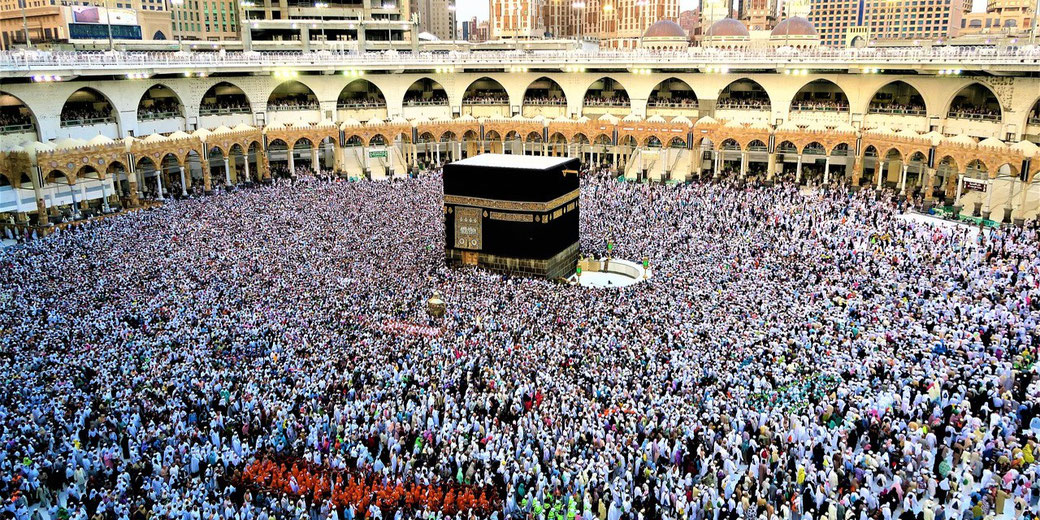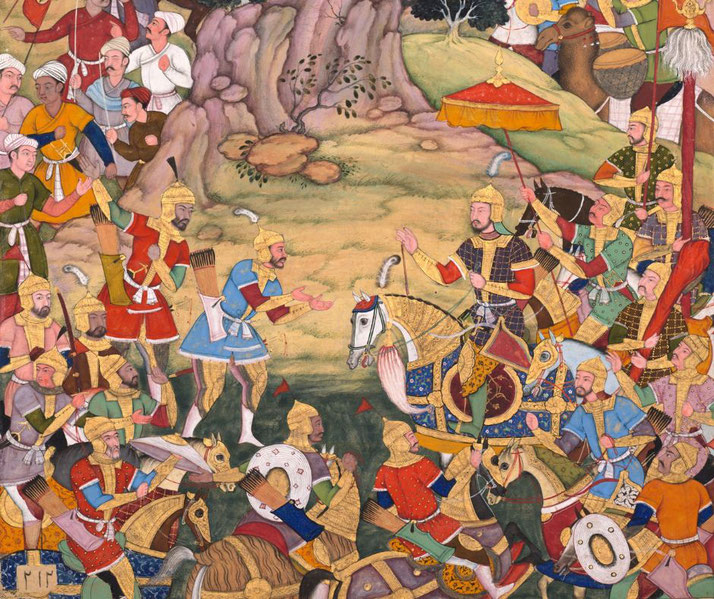From Mecca to Medina: The life of Muhammad and the birth of Islam

Islam is one of the world's largest religions and has over a billion followers spread across every continent. Its teachings, practices, and cultural influence permeate many aspects of daily life, not only in predominantly Muslim countries but also in communities around the globe.
Yet, the early days of Islam were difficult, as the first believers in the new faith faced resistance from those in power in the city of Mecca.
In fact, it would ultimately be the famous migration of the early Muslim community from Mecca to Medina (Yathrib), known as the Hijra, that was the major turning point in Islamic history.
What was Arabia like before Islam?
Before the arrival of Islamic belief (which is often referred to as Jahiliyyah or the "Age of Spiritual Ignorance"), the region of Arabia was a generally disunified area that was divided among various tribal groups.
Also, the tribes had their own unique customs, traditions, and leadership structures.
In addition, because each tribe had its own chief and powerful families, Arabia lacked a centralized political authority.
As a result, loyalty to one's tribe was a matter of honor and survival, and inter-tribal warfare was very common.
In the absence of a unified state, alliances between tribes became important, both in terms of trade and military.
Despite these differences, there were some common practices in these tribes. For example, poetry, oral traditions, and tribal gatherings were all central to social life.
In these, the individual character traits of bravery, hospitality, and loyalty were highly valued.
However, women's roles and statuses varied among tribes, with some enjoying significant rights and others facing marginalization.
In pre-Islamic Arabia, the tribes often worshipped a range of various gods and goddesses, in a system known as polytheism.
As such, these various divine beings were worshipped in various sanctuaries and sacred sites.
In fact, he Kaaba in Mecca, now the holiest site in Islam, was originally a shrine hosting a number of important idols of gods from different tribes.
At the time, it was believed that the Kaaba shrine had been originally built by the biblical patriarch Abraham and his son Ishmael.
Nevertheless, some monotheistic beliefs, including Christianity and Judaism, were also present in the region, particularly in the north and along trade routes.
Trade was actually the lifeblood of the Arabian economy, with caravan routes connecting the Peninsula to Africa, Asia, and the Mediterranean.
Cities like Mecca and Medina had become thriving commercial centers, which attracted merchants and pilgrims from nations far and wide.
The life of the Prophet Muhammad
Into this culture was born the person who would later be known as the Prophet Muhammad.
Historians believe he was born in Mecca around the year 570 CE into the powerful and respected tribe of Quraysh.
Sadly, he was orphaned at a young age and was raised by his grandfather and later his uncle, Abu Talib.
Apparently, he was known for his honesty and integrity as he grew, which earned him the nickname Al-Amin or 'The Trustworthy'.
At the age of 25, he entered the service of a wealthy widow named Khadijah bint Khuwaylid, whom he later married.
Around the age of 40, Muhammad began spending more time in contemplation, often in the cave of Hira near Mecca.
During one of these retreats, he received his first revelation from the Angel Gabriel.
Terrified and confused, he sought comfort from Khadijah, who supported him.
In fact, Khadijah, Muhammad's first wife would be the first person to convert to Islam.
She provided him with unwavering support and encouragement during the early years of his prophethood.
Over the next 23 years, he continued to receive revelations, which were later compiled into the Qur'an, the holy book of Islam.
These messages continually encouraged Muhammad to preach to the people of the city of Mecca in order to convert them to monotheism (the belief in only one god), social justice, and personal moral reform.
Unfortunately for Muhammad, his teachings were seen as a dangerous challenge to the existing social and religious order in Mecca.
This led to increasing hostility from the Quraysh leaders. For the small number of Muhammed's followers, they faced persecution, including economic sanctions, and sometimes, physical violence.
It didn't' take long for threats to their lives to become a daily occurrence and they were then driven out of the city in 622 CE.
Muhammad and his small band of followers migrated north to a friendly city called Yathrid, or Medina.
This long journey became known as the Hijra, which is now remembered every year.
In fact, this event marks the beginning of the Islamic calendar.
Once safely in Medina, Muhammad became the most important religious leader. In this role, he also became a political statesman and lawmaker for the community.
In fact, it appears that he established a kind of constitution that governed the diverse religious and tribal groups in the city.
Surprisingly, he also successfully led a number of small military campaigns to defend the community against attacks from troops sent against them by the city of Mecca.
After the failure of these attacked, in 628 CE, the Muhammad signed the Treaty of Hudaybiyyah the Quraysh of Mecca.
It allowed for a ten-year truce and enabling Muslims to perform the pilgrimage to Mecca so that they could worship Allah at the Kaaba.
Two years later, in 630 CE, Muhammad and his followers peacefully entered and took control of Mecca.
Then, they removed the idols from the Kaaba and dedicating it to the worship of Allah alone.
He continued to preach and consolidate the growing Muslim community. To overcome the tensions that still existed, Muhammad's preaching and laws had a focus on equality, compassion, and forgiveness among all people.
In 632 CE, Muhammad became ill while in Medina. After two weeks, he finally died on the 8th of June of that year and was buried in the city.
However, his death did not stop the spread of his religious message. Instead, Muhammad's followers would carry it further afield at an incredible speed.
What are the Qur'an and Hadith?
The central religious text of the Muslim religion is called the Qur'an. In Arabic, this word means "recitation".
The Qur'an is the collection of the sermons given by Muhammad during his lifetime and records the central beliefs of Islam.
For Muslims, this book is considered to be the literal word of God as revealed to the Prophet Muhammad.
In order to record them faithfully, the revelations were memorized and written down by the Prophet's companions during his lifetime.
Then, after his death, these writings were gradually compiled into a single book by the Caliph Abu Bakr, which was later standardized by the third Caliph, Uthman ibn Affan, which was to be used across the Muslim world.
The text of the Qur'an covers a wide range of subjects, including theology, law, social justice, family relations, and personal ethics.
It emphasizes the oneness of God (Tawhid), a defence of Muhammad's prophethood, the nature of the afterlife, and reasons why humans are accountable to Allah for their actions in life.
The Qur'an also provides guidelines for worship, business transactions, marriage, and other aspects of daily life.
For non-Muslims, the message of the verses is initially hard to understand, as they are often presented allegorically and require interpretation.
As a result, rich tradition of exegesis (Tafsir) developed over time to help explain the various meanings in the Qur'an.
To the Muslim community, the Qur'an is the primary source of Islamic law, known as Sharia, as it provides the fundamental principles that guide legal reasoning and decision-making.
Alongside the Hadith, it forms the basis for Fiqh: the human understanding of the divine law.
The Hadith is a collection of reports describing the sayings, actions, and approvals of Prophet Muhammad.
These reports provide context and explanation for the Qur'an's verses, and often offer practical examples of how to live according to Islamic principles.
The Hadith has been meticulously collected and classified by scholars, who evaluated the reliability of the narrators and the authenticity of the content.
The most respected collections include those by Bukhari, Muslim, and others.
As a result, Islamic scholars (Ulama) have developed various legal schools (Madhahib) that interpret the Qur'an and Hadith to address new situations and challenges followers face during their lives.
While the two texts are different books, the Qur'an and Hadith are considered to complement each other.
The Hadith provides context, elaboration, and practical application for the Qur'anic teachings.
The interpretation of these texts has led to a rich intellectual tradition, with scholars engaging in debate, reasoning (Ijtihad), and consensus (Ijma) to understand and apply the teachings in various cultural and historical contexts.
How Islam spread
Following the death of Prophet Muhammad in 632 CE, the Islamic community embarked on a series of military and political expansions under the leadership of the 'Rightly Guided Caliphs'.
Muhammad's close companion, Abu Bakr, became the first of these Caliphs.
He led the Muslim community and was the one that first initiated the collection of the Qur'an's revelations into a single book.
Within a few decades, Muslim armies had conquered vast territories, including the Persian Sassanian Empire and parts of the Byzantine Empire.
These early conquests were driven by a combination of religious zeal, economic incentives, and political ambitions.
However, the spread of Islam was not just a military phenomenon; it also involved significant cultural exchange between the conquerors and the people they controlled.
As Islam reached new regions, it interacted with local traditions, which led to a synthesis of cultures.
In fact, Islamic scholars made an effort to preserve and expanded upon Greek, Roman, and Indian knowledge, as well as contributing their own thoughts to fields such as mathematics, astronomy, medicine, and philosophy.
Additionally, trade played a vital role in the spread of Islam, particularly in regions like Southeast Asia, Africa, and the Indian subcontinent.
Muslim merchants, traders, and travelers established commercial networks that facilitated not only the exchange of goods but also ideas, technologies, and religious beliefs.
Along with the traders went the missionaries (Sufis) and scholars who helped spread the teachings of Islam in these regions.
Cities like Timbuktu, Samarkand, and Malacca soon became centers of both trade and Islamic learning.
In many regions, Islam was adopted by local rulers and elites, who then influenced their broader societies to accept the new religion.
Individual conversion of people into Islam was rarely forced; instead, it often occurred through interaction, intermarriage, economic incentives, and the appeal of Islamic social and legal principles.
As Islam spread to diverse cultural and geographical settings, it adapted to local conditions, leading to the development of regional variations.
Different schools of thought, legal traditions, and cultural practices emerged, which reflected flexibility of Islamic civilization.
The long-term interaction between Islam and local cultures produced unique expressions of art, architecture, literature, and spirituality in many different countries.

What do you need help with?
Download ready-to-use digital learning resources
Copyright © History Skills 2014-2025.
Contact via email
With the exception of links to external sites, some historical sources and extracts from specific publications, all content on this website is copyrighted by History Skills. This content may not be copied, republished or redistributed without written permission from the website creator. Please use the Contact page to obtain relevant permission.





